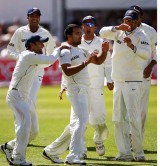Indian cricket teams are hopeless away from home. Down the years, that sentence has been as accepted a truism as the sun rising in the east and a fool and his money being parted. Only, like most stereotypes and clichés, it's no longer true. In the new millennium, India have won 16 Test matches away and 14 at home. And apart from New Zealand, where they lost a closely contested and low-scoring series 2-0 just before the 2003 World Cup, they've won matches in every Test-playing country.
The 16 successes outstrip what England (14), South Africa (13), Pakistan (13) and Sri Lanka (10) have achieved in the same period, and is second only to mighty Australia (26). What's more, they encompass closely-fought series in Australia, South Africa and England, venues where Asian teams are traditionally on a hiding to nothing.
The missing factor has been consistency. Several times, India have won a Test match away, only to come a cropper in the next game. The low of
Lahore after the magnificence of
Multan, the debacle in
Melbourne, where they were 278 for 1 at one stage on the opening day, after the miraculous triumph in
Adelaide and the
Durban surrender after high jinks in
Johannesburg all come to mind.
Perhaps most depressing though was the series in the Caribbean in 2002, when India drew first blood in
Trinidad, only to lose in
Barbados and be hustled out in
Jamaica just minutes before the onset of a storm that lasted for days. That wretched feeling was recalled a few months ago, with South Africa clinching the series in
Cape Town despite India getting first use of a pitch that appeared to have been airlifted from the subcontinent.
More importantly, for those who caricature Indians as flat-track bullies, these successes have been achieved on a variety of surfaces. At Adelaide, they conceded 556 in the first innings to Australia, yet came back to win on the final day, with Rahul Dravid's unbeaten 72 the perfect follow-up to an epic first-innings 233.
At the Wanderers last December, Mickey Arthur, South Africa's coach, asked for pace and bounce from the ground staff. They also left some grass on, and the lateral movement allowed Sreesanth and Zaheer Khan to rout South Africa for just 84. Months earlier, they had prevailed on a wretched pitch at
Sabina Park, with Dravid the main man on a pitch where even Brian Lara was made to look like a fumbling amateur.
Many of these triumphs have been notable too for the unlikely heroes that they threw up. Dravid's masterly 148 at
Headingley in 2002 is often spoken of, but few remember the invaluable 68 that Sanjay Bangar eked out when conditions were at their most spiteful. And in Pakistan two years later, the combination of Lakshmipathy Balaji and Irfan Pathan (12 wickets each) complemented Anil Kumble perfectly as India's unheralded attack comfortably outperformed Pakistan's over-hyped one.
But the most implausible bowling display of all came at the picturesque Adelaide Oval. Had it not been for that inspired afternoon, Ajit Agarkar's Test career would have been destined to be remembered only for his Bombay-Duck status - seven blobs in a row against Australia. But the spell of 6 for 41 set up an Indian victory and ensured Agarkar a prominent place in Indian cricket lore, even though he would never take a five-for again.
When they look back years from now, Indian cricket's golden generation will no doubt regret the fact that they couldn't build on some of those famous victories. Unlike Australia, or even England in the two-year stretch leading up to the Ashes win of 2005, consistency was never their forte. That shouldn't however be an excuse to bring out the poor-traveller tag, which is ill-informed and erroneous. They may not yet be Marco Polo, but the passport has enough stamps in it now to earn grudging respect.



